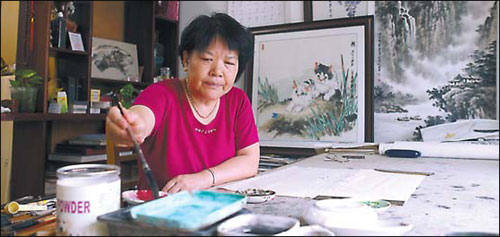
 |
|
Zhao Benfang paints at her home in Beijing. Feng Yongbin / China Daily |
Zhao Benfang is a warm-hearted ink artist. She always has visitors at her small apartment in Tianzhu, near the Beijing Capital International Airport.
Among the most frequent visitors are wandering cats that come and go from a hole in the window.
When they arrive in threes and fours, Zhao prepares food and toys, then attentively watches them play or sleep in the sitting room.
"I treat them well because they are my friends, as well as models and the inspiration for my paintings," says Zhao, 63.
The retired librarian devotes most of her time and energy to birds-and-flowers ink paintings.
For Zhao, painting has never been just a hobby or pastime. "Becoming an artist was my childhood dream," Zhao says.
Born to a peasant's family in Huaiyang, Henan province, Zhao worked at a factory and a community service center after finishing her middle school education.
"All those years, I taught myself drawing in secrecy," she says.
But she did not fulfill her dream of being an artist until 1979, when she moved to Beijing with her husband, a pilot.
Here she took a fulltime job at a Beijing library, but spent all her spare time learning ink art. Thirsty for knowledge, she eagerly sought apprenticeships from master painters Sun Jusheng (born in 1913) and Lou Shibai (1918-2010).
Later, she enrolled in intensive training classes at Beijing Fine Art Academy and studied art history at the Central Academy of Fine Arts.
Creating a good ink painting is not simple, explains Zhao, head of the Beijing Blue Sky Artists Association.
"To become a good ink painter, one needs to have a deep understanding of classical art history and the relevant aesthetics, in addition to a solid grasp of technique."
Compared with other genres such as portrait and mountains-and-waters painters that record social changes in a fairly realistic manner, Chinese birds-and-flowers ink art, beginning as an independent genre in the Tang Dynasty (AD 618-907), is not generally realistic.
Rather, it used to be a genre favored by intellectuals who gave their subjects symbolic meanings.
Without wanting to take the risk of angering the rulers of the day, painters often chose to express their inner thoughts through birds-and-flowers paintings.
"I paint my favorite subjects, such as cats and peony flowers, mainly to express my passion for life, my goodwill and fondness for friends," Zhao says with a smile.
She pays frequent visits to parks, zoos and botanical gardens, where she sketches flowers, birds and animals.
And she dares to innovate and find her own artistic style.
Zhao intentionally depicts animals so they appear to be like naughty, clever and energetic young children in the playground.
Cats, for instance, have impressively round, big, brightly colored, shiny eyes, soft, fluffy hair, and bigger heads than normal.
"I try to bring to life the cutest cats I can imagine," she says.
Zhao admits her paintings do not address weighty subjects but says, "Ink art can be a language through which people from different cultures communicate without obstacles".
Zhao will hold an exhibition in Taipei in late August, as part of a cross-Straits cultural exchange program. In November, she is likely to stage another art exhibition in Los Angeles.